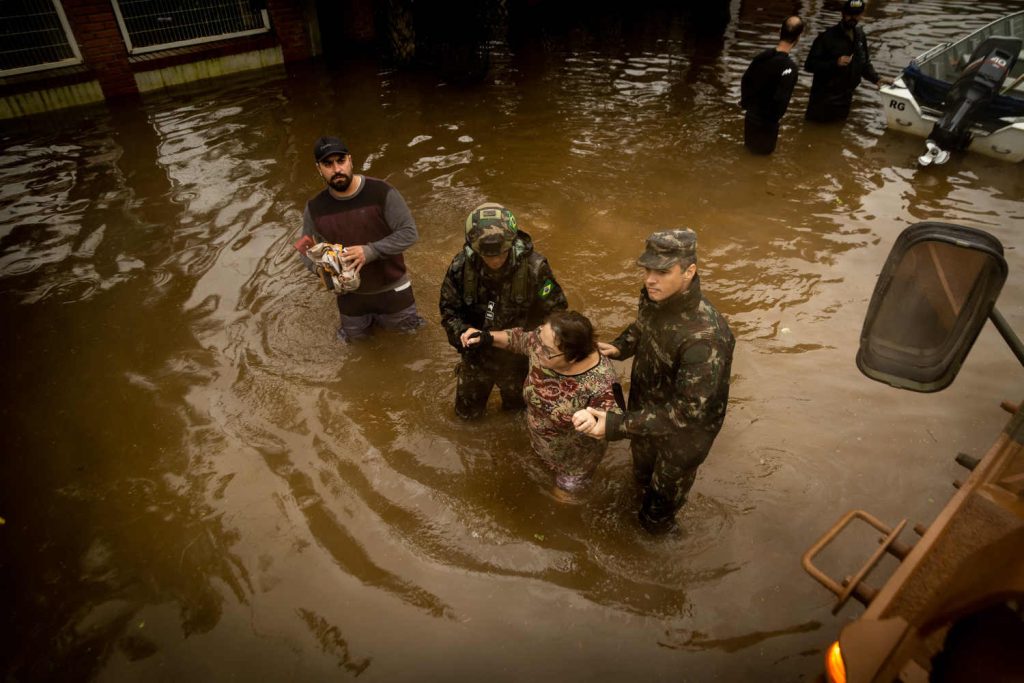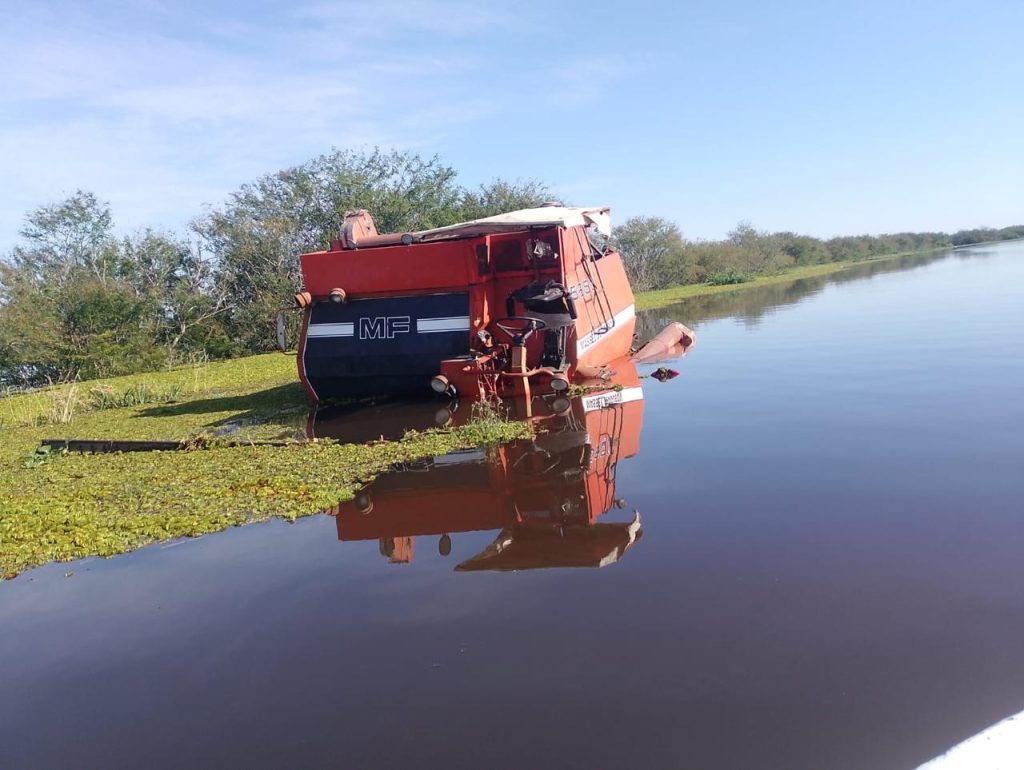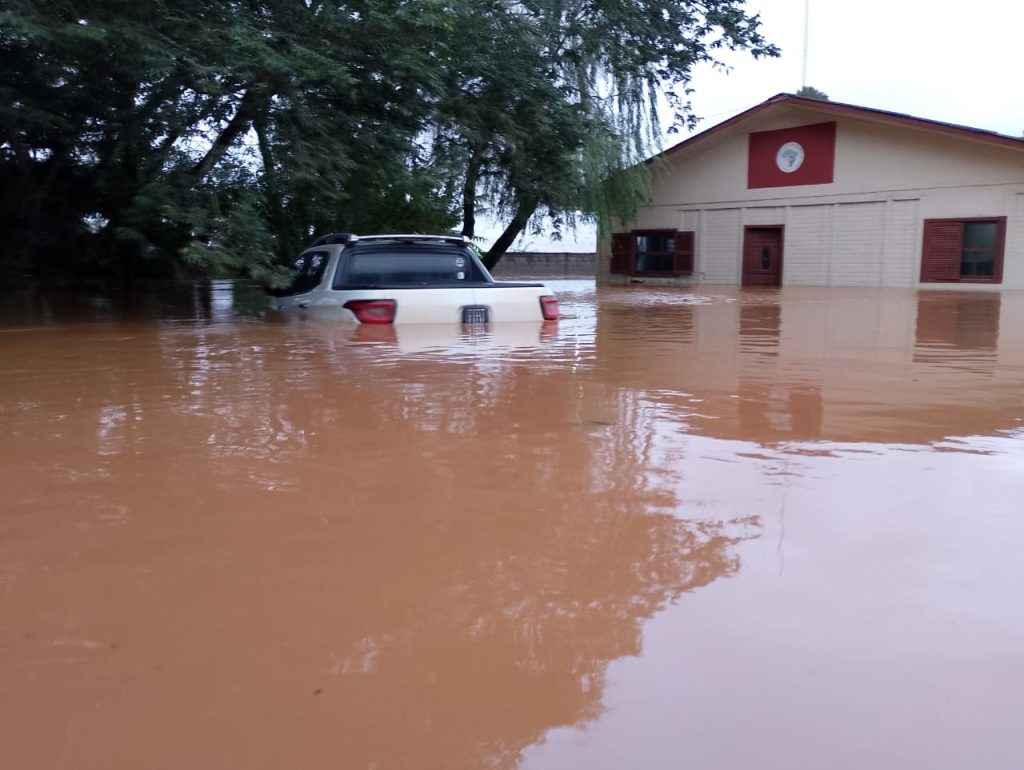Bagnolet, 03 June 2024: Faced with an unprecedented climate and environmental crisis affecting countries like Brazil, Ecuador, Uruguay, Argentina, Kenya, Tanzania, Afghanistan, France, Thailand, Indonesia, and others, in the form of heatwaves, heavy rains, and floods, La Via Campesina warns about those responsible and calls for urgent international solidarity and a concerted response led by people-led solutions.
THE TRAGEDY FORETOLD
Recent studies have revealed that the scorching heat that gripped Asia and the Middle East in late April, reminiscent of last year’s intense heatwaves, was made 45 times more probable in certain areas of the continent due to human-induced climate change. During this period, soaring temperatures were felt across extensive regions of Asia, stretching from Gaza in the west — where over 2 million people are grappling with clean water shortages, inadequate healthcare, and other essential needs amid ongoing Israeli airstrikes — to the Philippines in the southeast. Our members in affected countries such as Thailand report that heatwaves are destroying the crops and peasant lands. Water resources are drying up and the extremely hot day makes it dangerous for peasants to work in the field for the risk of heatstroke. Consequently, heavy rainstorm and huge floods reached Narathiwat province in the Deep South Region of Thailand in December 2023, causing the heaviest rainstorm in the last 50 years. Many parts of the continent experienced consecutive days with temperatures surpassing 40 degrees Celsius (104 degrees Fahrenheit).
The U.N.’s World Meteorological Organization and the European Union’s climate agency, Copernicus, report that Europe is warming at twice the rate of other continents, with a 30% increase in heat-related deaths over the past 20 years. This rapid warming hits farmers hardest, as they struggle with droughts, floods, and crop failures.
Higher-than-average ocean temperatures are causing increased evaporation, resulting in more rainfall and devastating floods across the continent. This is evident in Germany, northern Italy, central England and Slovenia, where heavy rains have led to significant flooding. In France, the contrast is stark: the southeast suffers from severe drought, while the north faces devastating floods. Agribusiness’s false solutions, such as megabasin projects, worsen these conditions by monopolizing land and water resources.
The floods that have inundated Afghanistan, Brazil, Burundi, Kenya, Thailand, Indonesia, some parts of Tanzania and many countries in Europe are also unprecedented in nature. While some reports attribute this to the El Niño Southern Oscillation (ENSO) and consider it a natural phenomenon that has occurred for centuries, scientific reports have revealed that a warming climate may contribute to an increase in the frequency and intensity of the El Niño phenomenon. The impacts may be significant at regional levels. In Central America, El Niño leads to excessive rainfall along the Caribbean coasts, while the Pacific coasts remain dry. Rainfall increases on the coasts of Ecuador, the northern part of Peru, and the southern zones of Chile. East African countries experience excessive rainfall too with increased intensity due to worsening climate change.
The World Health Organization warns that 3.6 billion people reside in climate change-vulnerable areas, potentially leading to 250,000 additional deaths yearly by 2030-2050, primarily due to malnutrition, malaria, diarrhea, heat stress, and now, vector-borne diseases. Climate change’s contribution to the escalation of vector-borne diseases in the low- and middle-income countries of Africa, which are already burdened with numerous health and socio-economic disparities, is a significant concern.
Countries of the Global South, already reeling under severe debt, do not have the resources necessary to adequately respond and adapt to these crises that primarily affect the working class and the peasantry — who also suffer from poor working conditions, inadequate housing, and limited health access. These catastrophes also pose a huge risk to food sovereignty of territories, pushing more people into extreme poverty and hunger. The wealthy industrialized economies that created these crises are still unwilling to acknowledge their liability and provide the necessary resources and capacities to the countries of the South.
AGRIBUSINESS, EXTRACTIVISM AND TRANSNATIONAL CORPORATIONS, ALONG WITH THEIR BANKS ARE THE MAJOR CULPRITS!
The industrial agribusiness system and extractivism are the main culprits of the crisis, as high rates of deforestation, land grabbing, loss of biodiversity, and reduced soil absorption exacerbate the environmental and climate crisis. The use of agrochemicals that kill biodiversity and contribute to rainfall disruption. Financial capital and banks dominate the world, and the Industrial Food System controlled by large transnational corporations from the Global North, constitute the main drivers of climate change, with agribusiness now responsible for over one-third of global greenhouse gas emissions.
The defense industry of the Global North promotes armed conflicts to sell weapons and sustain its profit rates, while wars directly affect our ecosystems and environment, resulting in the deaths of thousands of human beings. Let’s put an end to all foreign military bases, aggressions, and wars!
The environmental crisis the world is facing goes far beyond the climate crisis and originates in the way the capitalist system organizes the relationship between humans and nature. Profit-oriented production exploits both people and nature, depletes common natural resources, and jeopardizes the survival of humanity and life on the planet.
Capitalists, along with certain governments, seek to boost their profits by establishing the carbon credit system, which does not alter the reality regarding biodiversity or gas emissions, but fosters illusions through the sale of forest oxygen. It’s shameful.
LA VIA CAMPESINA ISSUES AN ALERT!
In the face of this grave crisis, La Via Campesina has been calling on states and governments to adopt concrete and resilient alternatives for affected populations. It insists that the fight against climate change must have political will but also ensure that communities have control over their territories, not transnational corporations. It’s urgent to change the system and transform food systems, identifying the responsible parties and their responsibilities, and implementing clear solutions such as the UN Declaration of Rights of Peasants (UNDROP), Peasant Agroecology and Food Sovereignty, which create dignified conditions, healthy nutrition, and regenerate life and nature.
Corporate influence on states, governments, and multilateral institutions leading to climate inaction and absurd denialism is unacceptable despite proven scientific evidence. We can’t continue with inefficient local and global public policies, implementing laws, treaties, regulations, and subsidies that consolidate and strengthen capitalism, the industrial food system, and their corporate interests.
REAL SOLUTIONS, NOT FALSE SOLUTIONS!
The discourse of green capitalism and agribusiness on climate-smart agriculture, presented as regenerative, along with other mechanisms such as carbon markets and nature-based solutions, is part of a greenwashing strategy. These false solutions, historically denounced by La Via Campesina at COP summits, have led to failures in climate and biodiversity COP processes in recent years and decades, under the influence of the market and multinational corporations.
The COP30 Climate in Brazil in 2025 and the CBD in September 2024 in Colombia must mark a radical turning point. Without this, these processes risk losing all credibility and legitimacy. In particular, the CBD and COP30 must place agrarian reform and land, water, and territory use at the center of their agenda, in the hands of populations, serving the production of food and other goods essential to human dignity, and not in the hands of multinational corporations catering to the whims of the wealthiest.
COPs should serve to find clear solutions, develop proposals, and alternatives to climate change in collaboration with countries and the scientific community. These spaces, now besieged by lobbying for the expansion of multinationals and wealth accumulation in the midst of the climate crisis, must rid themselves of these harmful actors and assume their historical responsibility towards the peoples of the world.
La Via Campesina has long advocated for real solutions that include peasants, indigenous peoples, and fisherfolk, who are the guardians of lands, forests, coastal areas, and oceans. We have long demanded comprehensive agrarian reform and land use policies in countries, and the restoration of soil health through peasant agroecological practices, as well as national legislation aligned with the UNDROP.[1]. Now more than ever, we must adapt cities and rural areas to face the climate crisis.
It is urgent to allocate funds to communities in the form of grants, not loans, as reparations for the historical responsibility in the climate crisis. These reparations should support community efforts to restore degraded lands by planting native trees, especially in areas where they have been destroyed.
It is imperative to establish agroecological production programs that guarantee an increase in the production of healthy food in harmony with nature.
It is essential to promote taxation measures that impose a minimum of 2% on the fortunes of billionaires (representing only 3,000 families) and instituting a universal tax on the profits of transnational corporations. This will enable the creation of a global fund to combat poverty, social inequality, and climate change.
These tools promote a just transition for peasants, and advocate for relocations in food production and consumption, guaranteeing food sovereignty and strengthening rural economies. Rooted in global climate justice principles, we continue to fight for reparations for historic debt and injustice. All climate finance must be in the hands of communities (not the banks!), must come in the form of grants (not loans!), and must prioritize both adaptation and mitigation.
We witness how in this capitalist system, the consequences of climate change prevail in most Global South countries, burdening those who produce everything and own little: workers living in socially vulnerable places within cities, expelled by real estate speculation and the actions of states legitimizing the establishment of companies and gated communities in the most privileged locations. So, in addition to social issues like hunger, poverty, lack of sanitation, armed violence, they must also endure the environmental problems that others have generated.
The environmental and climate justice struggle, both locally and globally, is urgent and must become a battleground so we can make progress in building real and truly effective solutions that address the environmental and social problems brought about by capitalism.
Therefore, we call on our entire social base – peasant farmers worldwide, urban workers, migrants, youth, women and diversities – to organize and undertake massive struggles to stop this capitalist madness that leads us to extinction. We are already paying a too high price with the loss of countless lives every day.
Food sovereignty cools the planet!
Peasant’ rights and agroecology for a climate just transition, NOW!
[1] UN Declaration on the Rights of Peasants and Other People Working in Rural Areas



